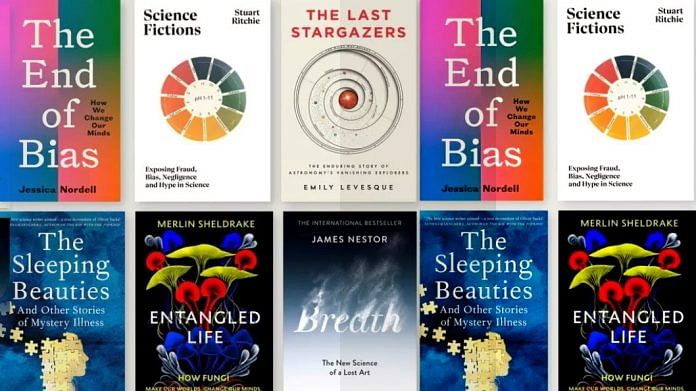- Judges highlight the importance of accessible science writing.
- The top six were chosen from a record number of 267 submissions.
- Winner of the £25,000 prize to be chosen in November.
- Two debut authors made the shortlist this year – James Nestor and Jessica Nordell.
What do breathing, mushrooms and stargazing all have in common? Books about them have all made it onto the shortlist for the Royal Society Science Book Prize 2021.
The six titles to feature on the 2021 shortlist were selected from a record number of 267 submissions from around the world.
The topics range from an account of what it’s like to be a woman in astronomy, why breathing optimally is so important for our health and well-being, and the scientific basis of why our views are biased.
“Important, accessible science writing is certainly alive and well with this enthralling list of titles,” said chair of the judges, Luke O’Neill, a professor of biochemistry at Trinity College Dublin, Ireland.
“Each is important and compelling, conveying the wonder of science but also highlighting issues that we should all be concerned about.”
What is the Royal Society Science Book Prize?
Now in its 33rd year, the Royal Society Science Book Prize promotes the accessibility and joy of popular science literature. The prize has celebrated some notable writers including Bill Bryson and Stephen Hawking, and most recently Dr. Camilla Pang and Caroline Criado Perez.
Each year, the judges search for the most compelling science writing of the last year. For 2021 the judging panel comprised of Professor Luke O’Neill; television presenter Ortis Deley; mathematician Dr. Anastasia Kisil; The Beekeeper of Aleppo author Christy Lefteri, and journalist, writer and filmmaker Clive Myrie.
The 2021 winner will be announced during a ceremony in London on 29 November and will receive a cheque for £25,000. The five other shortlisted authors will be awarded £2,500.
Who’s made the shortlist this year?
Two debut authors made the shortlist this year – journalist James Nestor and science and culture journalist Jessica Nordell. Penguin Random House secured three nominated titles on the list, and a third of the shortlist are from independent publishers.
The six books to make the shortlist are listed below in order of author surname.
The Last Stargazers: The Enduring Story of Astronomy’s Vanishing Explorers by Emily Levesque (Oneworld)
“The Last Stargazers is perfect for anyone who has ever wondered what it’s like to actually be an astronomer, or who has dreamt of staring up at the stars. Amidst the stories of mishaps and mistakes is a surprisingly romantic view of the glory of exploration, taken one dark night at a time.” – Dr Chris Lintott, BBC Four, The Sky at Night
Breath: The New Science of a Lost Art by James Nestor (Penguin Life)
“A fascinating scientific, cultural, spiritual and evolutionary history of the way humans breathe —and how we’ve all been doing it wrong for a long, long time.” – Elizabeth Gilbert, author of Big Magic and Eat Pray Love
The End of Bias: How We Change Our Minds by Jessica Nordell (Granta Books)
“Despite revolutions in our understanding of bias, we’re still much better at documenting the problem than solving it. When it comes to prevention and cure, Jessica Nordell’s powerful book is a breakthrough. With state-of-the-art science and gripping narratives, she reveals steps that individuals, groups, and institutions can take to fight prejudice.” – Adam Grant, author of Think Again
Have you read?
The Sleeping Beauties: And Other Stories of Mystery Illness by Suzanne O’Sullivan (Picador)
“O’Sullivan travels the world collecting fascinating stories of culture-bound syndromes, which she relays with nuance and sensitivity.” – Alice Robb, New Statesman
Science Fictions: Exposing Fraud, Bias, Negligence and Hype in Science by Stuart Ritchie (Bodley Head)
“We should listen to this warning about how neophilia and hype is ruining research… Ritchie has a gift for turning boring statistical processes into thrilling detective stories.” – The Times
Entangled Life: How Fungi Make Our Worlds, Change Our Minds and Shape Our Futures by Merlin Sheldrake (Bodley Head)
“Reads like an adventure story… wondrous… beguilingly weaves together lived experience and scientific research.” – Sunday Times
The World Economic Forum’s book club
The World Economic Forum launched its book club in 2018. Readers are invited to join from around the world to discuss a range of fiction and non-fiction books. The group discusses one book a month via its dedicated Facebook page.
6 books to improve your mental and physical health https://t.co/ZSxE5TR2TC pic.twitter.com/0Qg4P3ynUC
— WEFBookClub (@WEFBookClub) October 26, 2021
Each month the Forum publishes an extract from a new book on our social media channels and the group begins a chapter-by-chapter discussion. Here, members can comment and ask questions that are sent to the author. The author answers with a video response, giving our members the chance to connect directly.
Kayleigh Bateman, Senior Writer, Formative Content
The article first appeared in The World Economic Forum.
Also read: New book traces science & natural history of viruses



